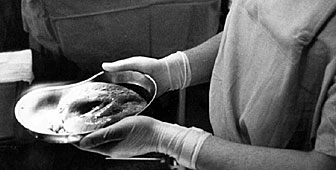Organ donation gets a legal boost

The number of organ donations is dramatically low in Switzerland, but the situation could change as a new law comes into force.
This establishes a national register, but improvement will depend on increasing awareness among the population.
The Federal Health Office says the Swiss need to make more of an effort when it comes to donating organs. A new campaign, based on this conviction, has been launched to tie in with the new law.
“In 2006, 38 people died waiting for an organ transplant in Switzerland,” said Thomas Zeltner, head of the health office, adding that the waiting list keeps growing. Currently there are 874 names on it – a situation Zeltner describes as “unacceptable”.
The reason for this is Switzerland has only 10.7 donors per million inhabitants in 2006 – in Europe only Greece fares worse.
“It’s essential to inform the public about the reality of the situation,” Zeltner said.
The health office will be soon sending out brochures on the topic to every household in the country.
Zeltner, himself the carrier of a donor card, pointed out that only 15 per cent of Swiss people carry one despite 60 per cent saying that they are open to donating organs.
He added it was imperative for people to make their wishes known to their family, as it was not enough to carry a donor card.
“In the absence of the deceased making their wishes known while they are alive, the decision falls on the shoulders of the family. Plunged into doubt and distress, the latter tend to say no [to organ donation],” Zeltner said.
National register
The main change introduced by the new law is the setting up of a national transplant register. The government has entrusted this project to the Swisstransplant foundation.
The register will help ensure that the distribution of organs is centralised using harmonised criteria. Currently various transplant centres based in university hospitals exercise this competence.
This means that the chances of getting an organ transplant in Zurich or Geneva are not exactly the same, although Zeltner says the differences are not that great in practice. The register will however make the procedure more transparent.
The new law also guarantees that medical treatment will be the same everywhere in Switzerland.
“We hope that more transparency will make the system more credible,” said Swisstranplant president Trix Heberlein. “My team has been preparing the change for a number of months now and we are ready.”
A software program especially developed for this purpose will manage organ distribution.
“We will pay attention to the medical urgency of a patient’s situation and also to how long he or she has been on the waiting list,” Heberlein said.
swissinfo with agencies
The new legislation came into force on Sunday.
There are broadly two types of consent when it comes to organ donation: explicit consent and assumed consent.
Explicit consent requires the agreement of both the donor or that of his or her relatives. This model is in force in the United States, Britain, Ireland, Germany, the Netherlands and Scandinavia.
With assumed consent, organ donation can occur unless the deceased or relatives disagree. This model is current in France, Italy, Spain, Portugal, Greece, Belgium, Austria and Luxembourg.
Switzerland uses both models, much to the chagrin of some cantonal governments.
The new law says an organ can be removed only if the donor consented to this before his or her death. In the absence of a document signed by the deceased, a relative must give consent. In the absence of relatives, organ removal is prohibited.
The first Swiss organ transplant, which was a kidney, took place in 1964 in the Zurich university hospital.

In compliance with the JTI standards
More: SWI swissinfo.ch certified by the Journalism Trust Initiative











You can find an overview of ongoing debates with our journalists here . Please join us!
If you want to start a conversation about a topic raised in this article or want to report factual errors, email us at english@swissinfo.ch.